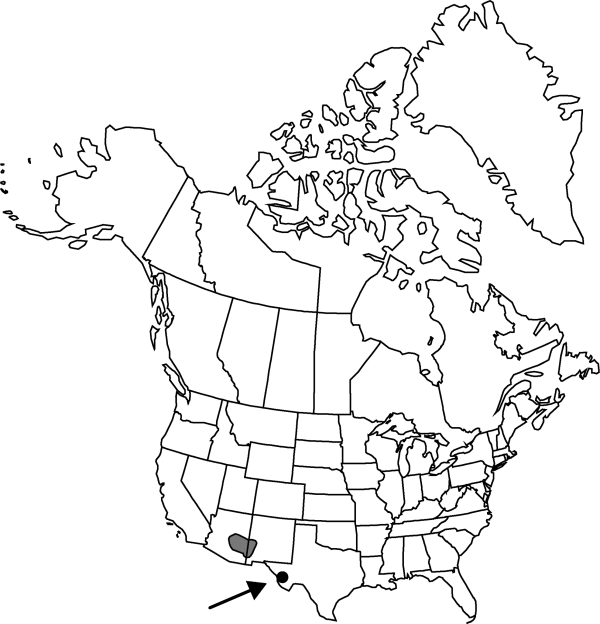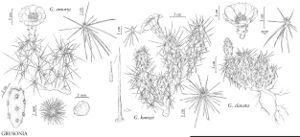Difference between revisions of "Grusonia emoryi"
J. Arizona-Nevada Acad. Sci. 32: 50. 1999.
FNA>Volume Importer |
imported>Volume Importer |
||
| (7 intermediate revisions by 2 users not shown) | |||
| Line 8: | Line 8: | ||
}} | }} | ||
|common_names=Devil club-cholla | |common_names=Devil club-cholla | ||
| − | |basionyms={{Treatment/ID/ | + | |special_status={{Treatment/ID/Special_status |
| + | |code=F | ||
| + | |label=Illustrated | ||
| + | }} | ||
| + | |basionyms={{Treatment/ID/Basionym | ||
|name=Opuntia emoryi | |name=Opuntia emoryi | ||
|authority=Engelmann | |authority=Engelmann | ||
| + | |rank=species | ||
| + | |publication_title=Proc. Amer. Acad. Arts | ||
| + | |publication_place=3: 303. 1856 | ||
}} | }} | ||
|synonyms={{Treatment/ID/Synonym | |synonyms={{Treatment/ID/Synonym | ||
|name=Corynopuntia stanlyi | |name=Corynopuntia stanlyi | ||
|authority=(Engelmann ex B. D. Jackson) F. M. Knuth | |authority=(Engelmann ex B. D. Jackson) F. M. Knuth | ||
| − | }}{{Treatment/ID/Synonym | + | |rank=species |
| + | }} {{Treatment/ID/Synonym | ||
|name=Grusonia stanlyi | |name=Grusonia stanlyi | ||
|authority=(Engelmann ex B. D. Jackson) H. Robinson | |authority=(Engelmann ex B. D. Jackson) H. Robinson | ||
| − | }}{{Treatment/ID/Synonym | + | |rank=species |
| + | }} {{Treatment/ID/Synonym | ||
|name=Opuntia stanlyi | |name=Opuntia stanlyi | ||
|authority=Engelmann ex B. D. Jackson | |authority=Engelmann ex B. D. Jackson | ||
| + | |rank=species | ||
}} | }} | ||
|hierarchy=Cactaceae;Cactaceae subfam. Opuntioideae;Grusonia;Grusonia emoryi | |hierarchy=Cactaceae;Cactaceae subfam. Opuntioideae;Grusonia;Grusonia emoryi | ||
| Line 29: | Line 39: | ||
}}<!-- | }}<!-- | ||
| − | --><span class="statement" id="st- | + | --><span class="statement" id="st-undefined" data-properties=""><b>Shrubs,</b> forming mats, 15–30 cm. <b>Roots</b> diffuse. <b>Stem</b> segments curved-clavate, gradually to abruptly narrowed at base, 7–19 × 2.5–5 cm; tubercles very prominent, 20–50 mm, 1–3.5 times longer than wide, not or little obscured by spines; areoles 4–6 mm in diam.; wool white to gray. <b>Spines</b> 12–30 per areole, mostly in apical areoles to ± uniformly distributed along stems (in northern populations), spreading, yellow, tan, or red-brown, tipped yellow, longest 3–7 cm; major 3–5 abaxial spines divergent, yellowish or red-brown, angular-flattened, sharp-edged; major (1–)3–5 adaxial spines ascending-divergent, tan or red-brown, angular-flattened to subterete. <b>Glochids</b> adaxial in areole, yellow to brown, 5–7 mm. <b>Flowers</b>: inner tepals yellow, 20–30 mm; filaments yellow to reddish; style cream; stigma lobes cream or tinged pink. <b>Fruits</b> yellow, cylindric to ellipsoid, 40–90 × 14–40 mm, fleshy, spineless (rarely with few very short spines) but usually densely yellow glochidiate; areoles 30–45. <b>Seeds</b> yellowish white to yellow, 5–6 × 3.5–4 mm, smooth. <b>2n</b> = 44.</span><!-- |
-->{{Treatment/Body | -->{{Treatment/Body | ||
| + | |phenology=Flowering late spring (May–Jun). | ||
|habitat=Chihuahuan and Sonoran deserts, sandy or gravelly desert flats, washes, hills | |habitat=Chihuahuan and Sonoran deserts, sandy or gravelly desert flats, washes, hills | ||
|elevation=700-1200 m | |elevation=700-1200 m | ||
| Line 43: | Line 54: | ||
-->{{#Taxon: | -->{{#Taxon: | ||
name=Grusonia emoryi | name=Grusonia emoryi | ||
| − | |||
|authority=(Engelmann) Pinkava | |authority=(Engelmann) Pinkava | ||
|rank=species | |rank=species | ||
| Line 50: | Line 60: | ||
|basionyms=Opuntia emoryi | |basionyms=Opuntia emoryi | ||
|family=Cactaceae | |family=Cactaceae | ||
| + | |phenology=Flowering late spring (May–Jun). | ||
|habitat=Chihuahuan and Sonoran deserts, sandy or gravelly desert flats, washes, hills | |habitat=Chihuahuan and Sonoran deserts, sandy or gravelly desert flats, washes, hills | ||
|elevation=700-1200 m | |elevation=700-1200 m | ||
| Line 56: | Line 67: | ||
|publication title=J. Arizona-Nevada Acad. Sci. | |publication title=J. Arizona-Nevada Acad. Sci. | ||
|publication year=1999 | |publication year=1999 | ||
| − | |special status= | + | |special status=Illustrated |
| − | |source xml=https:// | + | |source xml=https://bitbucket.org/aafc-mbb/fna-data-curation/src/2e0870ddd59836b60bcf96646a41e87ea5a5943a/coarse_grained_fna_xml/V4/V4_232.xml |
|subfamily=Cactaceae subfam. Opuntioideae | |subfamily=Cactaceae subfam. Opuntioideae | ||
|genus=Grusonia | |genus=Grusonia | ||
|species=Grusonia emoryi | |species=Grusonia emoryi | ||
| − | |||
| − | |||
| − | |||
| − | |||
| − | |||
| − | |||
| − | |||
| − | |||
| − | |||
| − | |||
| − | |||
| − | |||
| − | |||
| − | |||
| − | |||
| − | |||
| − | |||
| − | |||
| − | |||
| − | |||
| − | |||
| − | |||
| − | |||
| − | |||
| − | |||
| − | |||
| − | |||
| − | |||
| − | |||
| − | |||
| − | |||
| − | |||
| − | |||
| − | |||
| − | |||
| − | |||
| − | |||
| − | |||
| − | |||
| − | |||
| − | |||
| − | |||
| − | |||
| − | |||
| − | |||
| − | |||
| − | |||
| − | |||
| − | |||
}}<!-- | }}<!-- | ||
-->[[Category:Treatment]][[Category:Grusonia]] | -->[[Category:Treatment]][[Category:Grusonia]] | ||
Latest revision as of 22:57, 5 November 2020
Shrubs, forming mats, 15–30 cm. Roots diffuse. Stem segments curved-clavate, gradually to abruptly narrowed at base, 7–19 × 2.5–5 cm; tubercles very prominent, 20–50 mm, 1–3.5 times longer than wide, not or little obscured by spines; areoles 4–6 mm in diam.; wool white to gray. Spines 12–30 per areole, mostly in apical areoles to ± uniformly distributed along stems (in northern populations), spreading, yellow, tan, or red-brown, tipped yellow, longest 3–7 cm; major 3–5 abaxial spines divergent, yellowish or red-brown, angular-flattened, sharp-edged; major (1–)3–5 adaxial spines ascending-divergent, tan or red-brown, angular-flattened to subterete. Glochids adaxial in areole, yellow to brown, 5–7 mm. Flowers: inner tepals yellow, 20–30 mm; filaments yellow to reddish; style cream; stigma lobes cream or tinged pink. Fruits yellow, cylindric to ellipsoid, 40–90 × 14–40 mm, fleshy, spineless (rarely with few very short spines) but usually densely yellow glochidiate; areoles 30–45. Seeds yellowish white to yellow, 5–6 × 3.5–4 mm, smooth. 2n = 44.
Phenology: Flowering late spring (May–Jun).
Habitat: Chihuahuan and Sonoran deserts, sandy or gravelly desert flats, washes, hills
Elevation: 700-1200 m
Distribution

Ariz., N.Mex., Tex., Mexico (Chihuahua).
Discussion
Selected References
None.
